- Home
- Robert E. Howard
The Pirate Story Megapack: 25 Classic and Modern Tales Page 2
The Pirate Story Megapack: 25 Classic and Modern Tales Read online
Page 2
There was adventure for you—or misadventure—which Jim had suffered and taken as part of the day’s job, the risk that sharpened the edge of things. It was the tabasco sauce on life’s oyster to Jim, just an appetizer. One could get too much of it, but now—now life was as flat and stale as ditchwater or the placid green and blue reflecting wavelets of Lake Winnesota.
The ancient adages—and you will generally find them well based—depict Opportunity as Knocking at the Door and Adventure Waiting Around the Corner. Jim was fairly confident of the truth of the latter saying, he was beginning to doubt the verity of the former. Or else he was always out or asleep when the knock came. Even adventure seemed infinitely remote, despite his comparatively recent experience.
There are few of us—older than Jim, who was midway between twenty and thirty—who have much of life to look back to and remember, who have not had times when, swathed in the bonds of the commonplace, either complacent resentful or despondent, seemingly as fixed as an oyster to its rock-bed, the swift change of circumstance has not swept down upon us like a whirlwind from a clear sky and transported us to scenes and happenings we never dreamed of encountering. Opportunity and Adventure are sisters of the fates. Often the first, coming down the street hand in hand with the one who has opened the door to her knock, will turn the corner where Adventure lurks and the trio go on together, while Fortune smiles at another successful combination. So with Jim when he first saw clearly the gleaming emblem of the golden dolphin shining in the afternoon sun and felt that subtle quickening of spirit that we call presentment.
He turned from North Street, with its loafing tribute to slack times, and was strolling down a side avenue where elms met overhead in their June tracery of crisp green against the blue and gold of the sky. On either side he began to find the commercial district changing to the residential. He crossed the Winnetac River on its broad white-railed bridge and walked past old-time Colonial houses, not indicative of great wealth, but of vast comfort. There were lawns and lilacs, glimpses of more flowers at the back, robins listening-in for worms, grackles, and catbirds calling from the maples. It was a homey street and the sights and sounds and scents had their due effect upon Jim Lyman. Even as North Street had raised the ruff of his spirit in protest against the times, now it smoothed down like the ruff of a collie under the touch of a known and friendly hand.
Then he caught sight of the dolphin, ablaze in a direct shaft of sunlight, a heraldic dolphin, skillfully wrought in metal and nobly covered with burnished gold-leaf, not merely bronzed with baser metal.
It swung in a wrought iron frame—ungilded—that projected from a doorway with a Colonial Dutch hood. On either side the glazed-in porches showed old furniture, chairs, rockers, spinning wheels, rag rugs, warming pans, knockers, andirons—all of which confirmed the legend of the sign:
THE GOLDEN DOLPHIN ANTIQUES
K. Whiting, Prop.
Jim did not notice the lettering at first, he was too busy looking at the dolphin. In a way it was his totem, it was the symbol of the sea that he loved. Jim knew dolphins, the porpoises of the Pacific and their sharper-snouted cousins of the Atlantic, the acrobats of the ocean. He knew too the true dolphin, the dorado, with its protuberant forehead and long dorsal fin, the fish that really changes into exquisite degrees and blends of color as it dies upon the deck. The conventional form shown in the sign he knew also. He had seen it in ships’ decorations, on ancient charts that he had studied; once, at least, as the figurehead of a ship. It was as a figurehead he had last seen it.
He shifted his gaze from sign to porch-window. His pupils dilated, his lids narrowed. He pushed open the picket-gate and walked in a daze up the path toward the left-hand porch, walked as a hypnotic subject will, with gaze fixed on the object that has enchained the senses.
In the window was a background of old furnishings, enlivened here and there with bits of Oriental embroidery, lacquered trays, batiks, gleaming seashells. All these were subordinated—in the eyes of Jim—to the beautiful model of a ship, set on a low stand. The vessel was of exquisite design and its fashioning of rare artistry. The veriest landsman might see speed and buoyancy in the swelling streamlines of the hull, sweet as the contours of a bonito; the ambitious sheer of the stem, the curving counter, the rake of the four masts—the fore square-rigged, the others fore and aft. The model was complete with rigging and canvas, with boats slung in davits, skylights and awnings, miniature wheel, and binnacle; the tiniest details made a part of the loving, skilful craftsmanship.
On the bow and on the stern, there showed in golden lettering the name:
Golden Dolphin
BOSTON
And the figurehead was a replica of the sign that swung above the door of the shop, a supple, twisting body armored with golden scales, set with outspread golden fins that clung like fingers to the stem of the ship, a flowing tail and the goblin-like head with its rounded forehead and protruding lips that kissed the foam, as the windful sails drove on the gallant vessel. Any ship-lover and sea-lover could readily replace the stand with curling waves, creaming at the stem and along the run to fan-like wake; ignore the background of antiques and visualize instead the flowing sea and bright horizon where cloud argosies sailed before the wind. But that was not what Jim Lyman, standing entranced with contracting pupils, with parted lips, beheld back of the graceful hull and tapering masts. To him the actuality of the model had suddenly blended with a vision, as pictures blend upon the film-screen, reality of the present with recollection of the past.
He saw a tropic tangle, rather—so completely did the fantasy enthrall him—he was in a tropic tangle, peering through the rank growth of brush; palms and broad-leaved trees shot up high crowns that interlocked to bar out the sunshine and rendered daylight into a green twilight shot with golden beams hardly thicker than a cord and blobs of amber mottling the verdant floor. All about a riot of green growth wattled together with vines and ground shrubbery. Orchids were a-swing, giving out waves of intoxicant perfume. Two great butterflies, scarlet and black, hovered about like protesting guardian spirits of the place to which he had unwittingly forced his way. In his ears were the faint swish of the breeze in the treetops, the hiss of surf on the nearby beach and its heavier drumming on the barrier reef.
Verdure had flung itself, writhing, tentacled, embracing the hull of a vessel as if the jungle claimed a prize and was striving to hide it from prior ownership or the envy of discoverers; a ship whose stem—battered a little but unbroken—bore the shape of a golden dolphin as figurehead. The dolphin was tarnished and half hidden by creepers, but sunlight spotted it with flecks of flame.
The masts, four of them, had gone by the board. One of them slanted from ground to smashed rail, cordage twining it like snakes, a handy ladder for a handy man.
Now at this point Jim took on double embodiment—scarcely triple, for he was quite unconscious of being in front of the porch-window. Still in the jungle, he saw, from the jungle, one Jim Lyman forcing his way through resistant boughs to a closer view of the jungle stranded ship. On the bows the name had been applied in metal letters. Some of them were missing. On the starboard bow he read:
G LDE D LP N
On the counter, in sunken carving, was the full legend:
Golden Dolphin
BOSTON
He saw himself climbing that angling mast, reaching the deck, disappearing. The sudden shutting off of all sunlight, the deepening of the green twilight to gloom, the switch of palmtops in strengthening wind, the signal of a recall gun, voices calling his name—all dimmed. Even the ship—now a model again—faded. Something else absorbed him, something made contact with his inner self, brought it back to the present with a strange sensation—the identical quickening of the spirit that had accompanied his first sight of the sign, yet deeper, more intimate.
At the back of the display someone was opening a French window from the inner room. Brocades had parted to the touch of a white hand, a girl’s face appearing, pale in the d
usk, with luminous eyes, looking at Jim. The expression, emphasized by piquant eyebrows, registered surprise at what the owner read in Jim’s bemused gaze. A slightly amused smile came to the red lips, but there was no ridicule in it, only friendliness; a sort of intimacy, as if she, too, liked that ship’s model, and knowing he did, acknowledged the link between them.
She leaned forward. A slender arm, bare to the elbow, rounded, soft and white of skin, reached out and slim fingers took up a blue and white pitcher. Jug and girl disappeared through the brocades.
The spell was broken. Jim, self-convicted of staring, imagined he must have looked like a moonstruck fool. While every lass may love a sailor, it is not every sailor that loves every lass, despite the ballads. The sweetheart in every port is a calumny born of jealousy. Your blue water salt is perforce a hermit for long periods. If he has brains he becomes a bit of a philosopher. He learns to think while on watch; and the rolling sea, the roving clouds, the chanting winds, the sun, the moon and the stars rolling in their appointed courses, are all good teachers. Jim was a bit of a poet at heart. So is every true sailor. He had had his own dreams of the measure of a girl, but he had had few opportunities for metrical diversion. Also he was a bit flustered in their presence. He did not understand them, they were like fine lace to a carpet weaver, admirable but strange to his craft. The girl, so far, was but incidental to the main point. His jaw lines tensed as he went up the steps beneath the Dutch hood and through the door with the tinkling of an automatic bell. He half expected to see a customer inside in connection with the blue and white pitcher. And there would be the K. Whiting, proprietor. But the girl came forward to meet him out of shadows empty of other humanity though close set with furniture, tip-tables, chairs, sofas, standard lamps, and century-old belongings.
Jim’s eyes were good, dark or light. He saw that she had on a dress of deep blue, ocean blue, flicked with small dots of lighter blue. Her eyebrows again arched quizzically as Jim stood, hat in hand, lost for opening words.
“Mr. Whiting in?” he asked. Somehow the girl took his breath a bit. Cool and dainty, self reliant, but utterly feminine. A face so good to look at that he did not know whether she was pretty or not. Womanhood, that was what she represented to Jim, though she was young yet, young and sweet. She was disturbing. He had come in to see about the ship and she made his desire vacillating. His will struck for the original motive, therefore he asked to talk with a man.
“There is no Mr. Whiting—here,” she answered, a slight hesitancy before the last word, a fleeting shadow over her face. “I am the proprietor. You were looking at the ship? You are a sailor, aren’t you?”
This is what the girl saw:
A man who had boyhood in his eyes and about his mouth, though the first were steady, the second firm enough; a face tanned deep; eyes of gray with little traceries of sun and wind about them; aquiline nose; good forehead; brown hair that was a little sunburned here and there, plenty of it and the barest suggestion of a wave; tall—about six feet—a hundred and seventy pounds of solidity, chest like a barrel and a lean waist; clothes, blue serge, fairly new, well kept; hands, well kept, but hands that were used to work and showed it, hands held slightly curved inward as if ready to grasp a rope. Being a woman, she took this all in at a glance, while to Jim’s equal opportunity she was more or less a vague pleasantness. It was the combination of blue serge, the half open hands and the look in his eyes as he viewed the ship that had set him down as a sailor to the girl. She knew something of sailors. Also she knew that she liked Jim. Instinctively she felt that she could trust him. Women and dogs can do that at first sight—scent also, with the dogs. Man’s intuitions are less blunted. It is not so necessary for him to be attracted or warned through his senses; he has developed other ways of obtaining information, other ways of protection which often prove far less infallible.
“Yes, I am a sailor,” he said. “Was, at least. Hope to be so again. Is the ship for sale? I mean does it belong to somebody here or did you buy it outright to sell again?”
Something of his excitement had spread to the girl; the atmosphere in the shop, transformed from original parlors, dusky save for the lighter space by the door where they stood, was becoming charged with magnetism.
“Why do you ask?” she said.
“I’m not a purchaser—though I’d like to be if I could afford it and had a place to put it.” Subconsciously he was stalling, delaying the information that momentarily he more and more felt was going to start something. There was a knocking at the door of his inner self. Then he blurted it out.
“I’ve seen that ship before. Not the model but the ship itself, ashore in the bush on an island in the South Pacific.”
The girl blanched, all color draining from her face and even her lips. Jim put out a hand to steady her as she swayed, but she caught at the high back of a chair and stood with the corner of her underlip caught between small teeth, her eyes masked for a moment. Then they widened, rounded, searched him.
“That was my father’s ship,” she said. “We have believed him lost at sea. Tell me about it, please.” Jim hesitated, reluctant. He felt that he had unveiled a tragedy, that he had struck a deadly blow at this girl who met disaster so bravely. She even smiled at him, wanly but bravely.
“Please,” she repeated and Jim knew then that her voice had power to compel him to do its bidding, now and for always; knew instantly that here was the last girl on earth he would have wounded.
“I know,” she said. “You think he must be dead. But he is not. I have always been sure of that, quite sure.” And despite Jim’s contrary belief her tone carried conviction to him. “I knew he was lost somewhere, but he is not dead. You have brought me the best of news. And you will tell me all about it? It is closing time anyway, and time for lights.”
She closed the door and set the latch, drew down a blind and turned a switch. Two old standing lamps with Chinese shades illuminated the place. She led the way toward the back of the room and motioned to a seat on a settle that formed a screen from the rest of the shop. There was a little table there and a businesslike looking desk.
“I shall be back in a moment,” she said and vanished toward the back of the house. “Smoke, if you want to.”
Jim did not want to smoke. With her departure the momentary belief he had shared with her that her father was not dead oozed out through his pores. The searchlight of his will was summoning details of his discovery in the jungle and now he could see, gleaming white among the ground vines distinctly as if it lay on the floor in front of him, a skeleton, the bones picked clean by ants, the cage of the ribs bound to backbone and pelvis by a network of tendrils—and a skull, with a gold bridge gleaming in its fallen jaw. It was not that of a victim of the sea. The dome had been rudely cleft by a blunt weapon. Surely the skull of a white man.
II
Adventure
The girl came back accompanied by a bony person with a bony face that suggested a horse, a thin, tall austere person who looked as if most of the blood had been drained out of her, and with it all of the milk of human kindness that her veins might have contained. She smiled at Jim, displaying big teeth liberally inset with gold. She was dressed in rusty black material that hung on her like stuff flung hastily over a clothes-rack. Her pale hair had brassy streaks in it. Her eyes were almost colorless, lacking eyebrows. The whole was redeemed, almost nullified, by a voice of wonderful contralto richness, suggesting in its beauty everything that the rest of her did not.
She bore a tray with plates and cups and saucers upon it, napkins of fine old linen, a dish of cake and cookies. The girl brought a pewter trencher bearing a teapot, cream ewer and sugar bowl of old Sheffield plate; the teapot under a quilted cozy shaped like a helmet. These they set down upon the table. To think of tea at a moment tense with the first news after months of suspense—years perhaps, for it was hard to guess how long the ship had lain in its canting jungle bed! The hospitality of gentlewomen. Jim recognized the quality though he was n
ot used to sharing its niceties.
“I am Katherine Whiting,” said the girl. “I should like to introduce you to my cousin, Lynda Warner, Mr. —?”
“Lyman, Jim Lyman.” Jim stood up, heard the marvelous richness of that voice—though it did not seem as sweet to him as the clear, high note of the girl’s—sat down, sipped some tea, broke a cookie and began his yarn. North Street and its unemployed seemed a thousand miles away. The whirligig of time was bringing about its own revenges.
“It’s not much of a yarn—my end of it. It happened on my last voyage. I’ve sailed on both oceans, Atlantic and Pacific, but I like the Pacific best. I was on this side, as it happened, the trip before last, and after we’d landed cargo at Porto Bello, we laid up for repairs. I took a notion to cross to the Pacific side. The skipper was agreeable. The owners were always willing to cut expenses and the ports these days are full of sailormen looking for a berth.
“Things were slack at Panama, but after a bit I shipped on the four-masted schooner Whitewing, bound for Tahiti, a forty-five hundred mile run. We never got there. East of the Paumotus we ran into a wicked storm, a hurricane. They call the group the Dangerous Islands and they’ve named ’em right. The danger is all around ’em. First our mizzen mast smashed off as if some giant had hit it with an axe. All we had set to that gale was a storm staysail and a bit of the spanker, but that was yards too much. That storm fair wrenched us apart. Before we could hack the mizzen clear it had smashed the rudder.
“There we bucked, five foot of water in the hold, and rising, seams opening, three men out of eleven hurt, to say nothing of the skipper himself with his head split by the spanker-boom. We got the steam-pump assembled finally and the water out of her, but not till after we’d been blown way out of our course, far south of Pitcairn, south of Rapa. Twice the jury rudder we had rigged gave way on us, and we were in a sad mess the morning we picked up that bit of land, a mountain top lifting up from the sea in a wrack of vapor clouds, like a finger stuck through a veil—and beckoning. Some of us fancied we saw loom of high land way to the west, but you couldn’t be sure, the weather ’ud open up a bit and shut down again with all the horizon banked up with clouds that looked like dark gray wool.

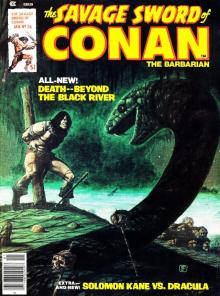 Beyond the Black River
Beyond the Black River Gods of the North
Gods of the North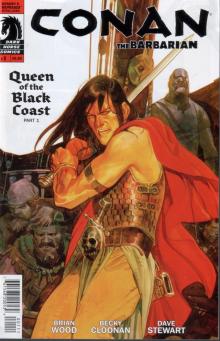 Queen of the Black Coast
Queen of the Black Coast The People of the Black Circle
The People of the Black Circle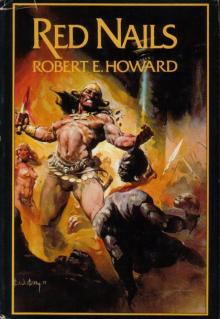 Red Nails
Red Nails A Witch Shall Be Born
A Witch Shall Be Born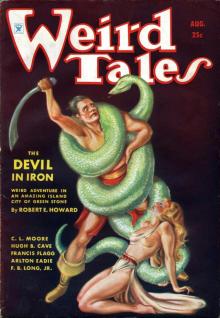 The Devil in Iron
The Devil in Iron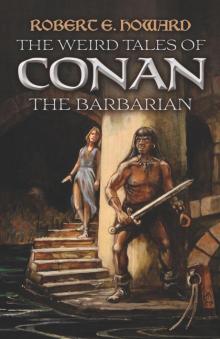 The Weird Tales of Conan the Barbarian
The Weird Tales of Conan the Barbarian The Bloody Crown of Conan
The Bloody Crown of Conan The Horror Stories of Robert E. Howard
The Horror Stories of Robert E. Howard Conan the Conqueror
Conan the Conqueror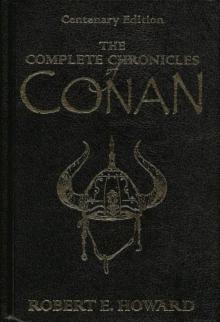 Conan the Barbarian
Conan the Barbarian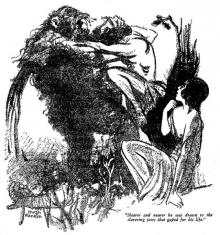 Shadows in the Moonlight
Shadows in the Moonlight The Savage Tales of Solomon Kane
The Savage Tales of Solomon Kane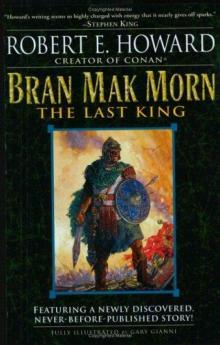 Bran Mak Morn: The Last King
Bran Mak Morn: The Last King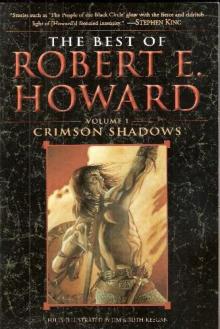 The Best of Robert E. Howard Volume One: Crimson Shadows
The Best of Robert E. Howard Volume One: Crimson Shadows The Best of Robert E. Howard: Crimson Shadows (Volume 1)
The Best of Robert E. Howard: Crimson Shadows (Volume 1) Black Hounds of Death
Black Hounds of Death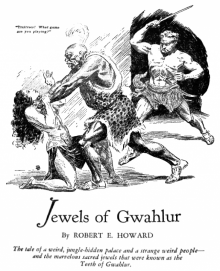 Jewels of Gwahlur
Jewels of Gwahlur Shadows in Zamboula
Shadows in Zamboula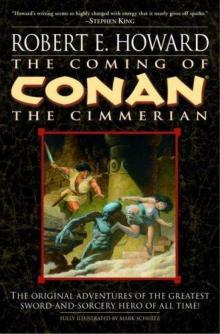 The Coming of Conan the Cimmerian
The Coming of Conan the Cimmerian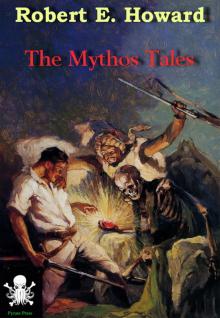 The Mythos Tales
The Mythos Tales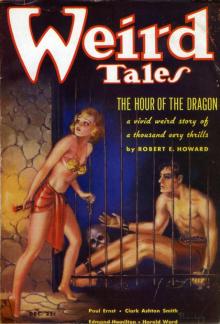 The Hour of the Dragon
The Hour of the Dragon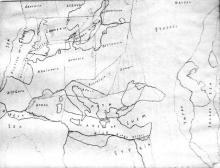 The Hyborian Age
The Hyborian Age El Borak and Other Desert Adventures
El Borak and Other Desert Adventures The Best of Robert E. Howard Volume 1 The Best of Robert E. Howard Volume 1
The Best of Robert E. Howard Volume 1 The Best of Robert E. Howard Volume 1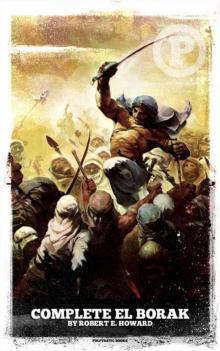 El Borak: The Complete Tales
El Borak: The Complete Tales Kull: Exile of Atlantis
Kull: Exile of Atlantis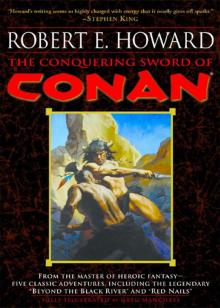 The Conquering Sword of Conan
The Conquering Sword of Conan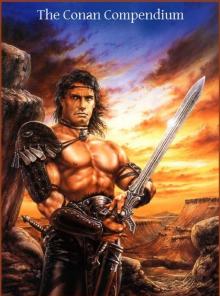 The Conan Compendium
The Conan Compendium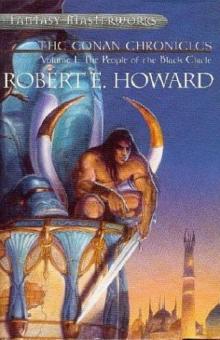 The Conan Chronicles: Volume 1: The People of the Black Circle
The Conan Chronicles: Volume 1: The People of the Black Circle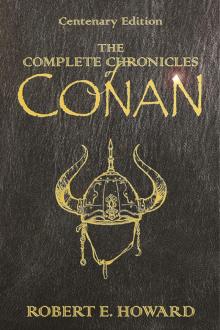 The Complete Chronicles of Conan: Centenary Edition
The Complete Chronicles of Conan: Centenary Edition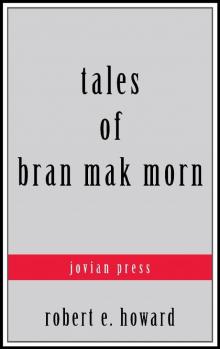 Tales of Bran Mak Morn (Serapis Classics)
Tales of Bran Mak Morn (Serapis Classics) Delphi Works of Robert E. Howard (Illustrated) (Series Four)
Delphi Works of Robert E. Howard (Illustrated) (Series Four) Conan the Barbarian: The Stories That Inspired the Movie
Conan the Barbarian: The Stories That Inspired the Movie People of the Dark Robert Ervin Howard
People of the Dark Robert Ervin Howard Grim Lands
Grim Lands Wings in the Night
Wings in the Night Gardens of Fear
Gardens of Fear A Thunder of Trumpets
A Thunder of Trumpets Detective of the Occult
Detective of the Occult Sword Woman and Other Historical Adventures
Sword Woman and Other Historical Adventures Historical Adventures
Historical Adventures Moon of Skulls
Moon of Skulls The Robert E. Howard Omnibus: 97 Collected Stories
The Robert E. Howard Omnibus: 97 Collected Stories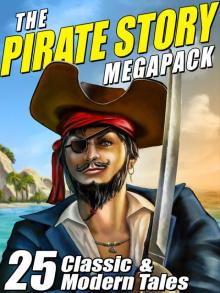 The Pirate Story Megapack: 25 Classic and Modern Tales
The Pirate Story Megapack: 25 Classic and Modern Tales The Best of Robert E. Howard, Volume 2
The Best of Robert E. Howard, Volume 2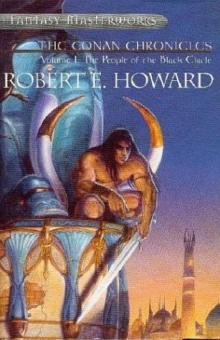 The Conan Chronicles, Vol. 1: The People of the Black Circle
The Conan Chronicles, Vol. 1: The People of the Black Circle Sword Woman and Other Historical Adventures M
Sword Woman and Other Historical Adventures M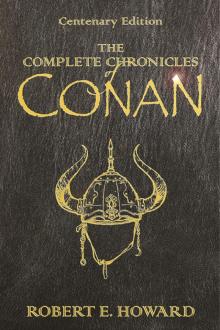 The Complete Chronicles of Conan
The Complete Chronicles of Conan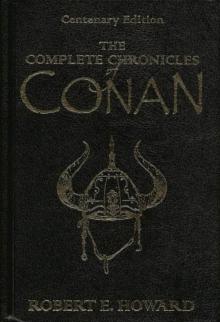 Conan the Barbarian: The Chronicles of Conan (collected short stories)
Conan the Barbarian: The Chronicles of Conan (collected short stories) The Conan the Barbarian Stories
The Conan the Barbarian Stories The Best Horror Stories of
The Best Horror Stories of Tigers Of The Sea cma-4
Tigers Of The Sea cma-4 The Hours of the Dragon
The Hours of the Dragon Conan the Cimmerian: The Complete Tales (Trilogus Classics)
Conan the Cimmerian: The Complete Tales (Trilogus Classics) Collected Western Stories of Robert E. Howard (Unexpurgated Edition) (Halcyon Classics)
Collected Western Stories of Robert E. Howard (Unexpurgated Edition) (Halcyon Classics) The Best of Robert E. Howard, Volume 1
The Best of Robert E. Howard, Volume 1 Shadow Kingdoms
Shadow Kingdoms